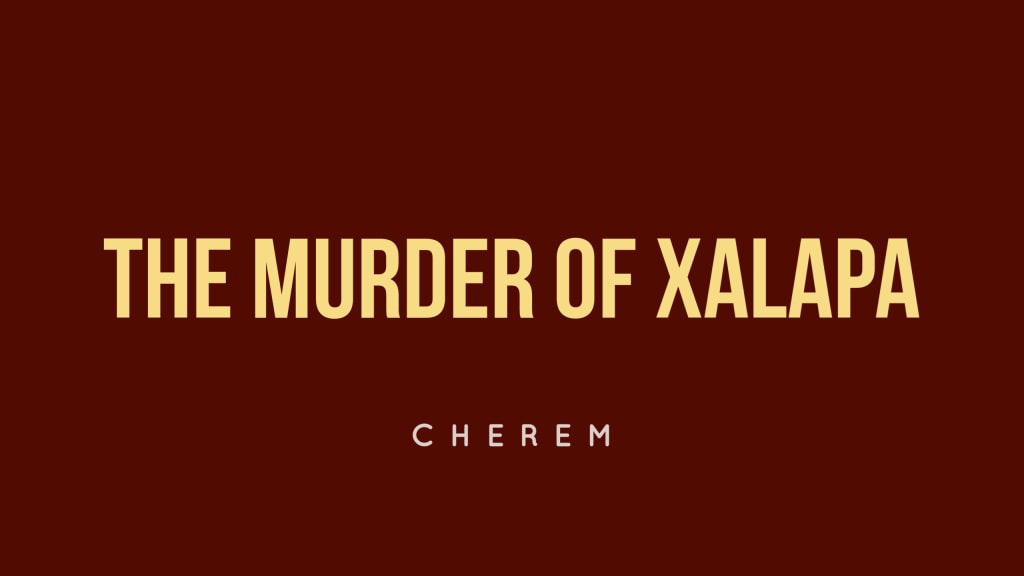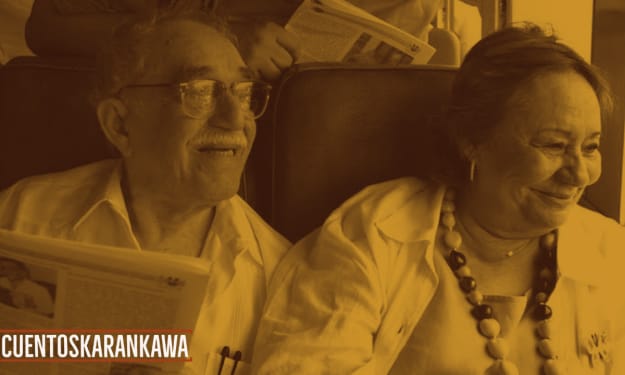The Murder of Xalapa (Part I)
1,999 words in the times of COVID-19.

The most beautiful man of the English-speaking world is about to do the unthinkable. He is quite mad, but he is more sad than angry. He is tall and has the perfect tan sin of the Caribbean and the Mediterranean Sea. He just lost a good friend and his first friend, Mr. Yépez.
Mr. Yépez has disappeared.
Mr. Yépez was Cherem’s first friend when Cherem arrived in the port city of St. Martha. Cherem is an Afghanistan and Iraq War veteran. He always wanted to be a storyteller. His mother worked a lot, so he was raised by his grandmother, Mrs. Zahab. Mrs. Zahab loved him dearly. Cherem loved her a lot. She will sit Cherem down on this blue and green sofa with little shavings that looked like a great artist who had just painted Salome.
The sofa had freckles. The freckles were the shavings. The shavings were all over the couch. The sofa’s freckles were yellow, dark purple, dark green, light green, orange, and red. The sofa was blue and green, and it was fixed twice by a man his grandmother knew in Mexico. Mrs. Zahab Bajarano was born in Minsk County, Belarus. Her father, Jazep Bajarano, was one out of the 160 Jews hand-selected by Odilo Globonick.
“Odilo, Cherem, was the highest-ranking member of the Schutzstaffel (SS), Hilter’s protection squad,” his grandmother will tell him in Spanish. Cherem will be sitting down listening to her. She will always lean in to tell the story. Then, she will turn off the television.
She will struggle to get up. Cherem will quickly get up.
“I’m old,” she will tell him in Spanish, “but not useless,” and she will wink at Cherem. She always winked with her right eye. Cherem will ask her to wink with “the other one,” which was one of their favorite games. “Mmm, who is strong?” she will ask him and make a cute strong face. “You,” Cherem will answer. He will tilt his head slightly up. He was the only grandson who came out blonde, blonde, but he came out with dark black eyes.
Cherem had the same eyes as her father.
She will walk as she could. Cherem will just move his head and pray. Her 28 eight steps, taken by the swollen feet of a woman who had seen everything, seemed eternal for Cherem. She will bend down how she could. She never allowed herself to make a face. She held everything in.
Then she will crank the silver knob from “5” to “U.”
Cherem will feel clicks despite being four or five feet away.
There was a pretty brown table between them and the television. But Cherem will never move it. His mother will never move it. Mr. Archie, a black man from apartment number 516, had given it to them. He was outside with three other men. He was smoking a Newport and talking. The other gentleman had had two long thumbnails, but the rest were perfectly cut. He was the fattest of the tree, and he was also the youngest.
He was smoking a Black & Mild that had been put down carefully three times. He only had five or six drags left. Mr. Archie was telling them a good story, and they were listening. The story was so good that the fat one forgot to take his last three hits, and when he realized this was true, he made a mad face and shook his head slightly three times. Both men are facing Archie at the intersection of a cement pathway and a narrower cement pathway. Patches of sporadic grass are on both sides of the cement pathway. Each quadrant is intersected by six narrow cement pathways.
The main artery is ocean pearl white if you remove the five gum pieces that have turned black on the cement. They all have the same shape and curve.
The six veins on each side of the pathway are darker, greyer, and dirty. Both were made of the same material and placed at the exact same time.
There are patches of sporadic grass between each vein, some brown things that look like fibers, twenty-five-cent chips plastic bags; some are inverted, others are not, and a rolled-up napkin here or there.
Five brown paper bags have been crunched up. They are on the ground. A few inches away from the dark green wooden fence all the way in the back.
The picket spacing is 1 1/2 centimeters apart.
Archie is dead center. His sacrum and his vertebrate are perfectly aligned with the center-post of the dark green wooden fence. The fifth, sixth, and seventh picket from the center-post has been kicked in. You can barely see the gap that takes you from Seven Corner Apartments to the Radio Shack.
A few people are outside. Most are at work. The sky is somewhat grey, looking like it is about to rain.
From the east, you can see the sun trying to make its way in. The sky is relatively low, sometimes in Minneapolis.
It is Fall, around August.
A black 1986 Ford LTD Crown Victoria S four-door sedan with tinted windows comes in. She is tired. She made a 27-hour drive in 52 hours with a newborn baby who smells brand new. He is still just the glow, and he is all smiles.
He was born 192 hours ago.
She closes her eyes when she is alone or when she looks at him; she gives thanks. She is grateful to have him. She is thankful he does not cry.
“He is a good one,” she tells herself.
Her mother is holding the baby under a white blanket they bought in Mexico.
“Pass me the thing,” she tells her mother.
She holds the baby firm and opens the glove box slowly.
She leans over. She is short. She stretches.
She knows her mother won’t touch it. She gives her disappointing eyes when she sees it.
She has not noticed the three black men looking at the car.
Her mother gently opens it.
“I got it, mom,” Zaranda tells her mother in Spanish.
Mrs. Zahab hears the click that means stop.
Zaranda takes the CZ-75 pistol.
The barrel is a solid metallic black.
The handle is made of the best wood of the state of Tamaulipas. It is a dark three shades of brown with black lines that look like fingerprints.
There’s a gold emblem on both sides of the pistol.
It reads “AA” in 18k gold. It is a beauty to see. It shines perfectly in every angle. Two female roses are drawn with 18k gold. They do not touch. They form a “U” shape around the “AA,” which is perfectly centered. Both stems have five thorns—three on the left and two on the right.
Her mother moves back and holds the baby.
Zaranda has sixteen 40 caliber rounds on her magazine and one in the chamber.
The initials of the man she married, Arturo Azzora-Aschwatz, are on the gun. Those who are important in the port city of Bagdad, Tamaulipas, are only called by their last name. And they only use their last name.
He was a good man.
Arturo was a sturdy businessman of good and respected and feared lineage.
His family never paid for food. Where they sat, people will bring them food. This tradition continues to this day.
They will always refuse, and the business owners and workers will not take their money.
She married him five years ago. Arturo bought her whole family the best cars, and for the first time, none of them were on foot. He loaned two of Zaranda’s sister’s husband’s money, never expecting the money back but always placing the most crumbling fear on them. It was all game, and people knew it was a game.
Arturo was the guy who hated stupid and people acting peasants. He hated most liars or people who would be kind or spoke friendly to extract whatever they wanted to extract. Throughout his reign, these people were gone.
His father, Arturo Nepomuceno Azzora Cárdenas, made millions through the prohibition. Texas’s prohibition started in 1872 and “ended” in 1934 for the whites and 1942 for the Mexicans who lived on the border.
This meant profitable business. Arturo Nepomuceno’s grandad, Arturo Maria Jose Azzora Ledezma, was of an old breed who will look at your eyes and stare. He was a campesino (“a farm-hand”) who would spend a lot of time with the cattle. He liked to spend time with the goats, bulls, cows, horses, and the 37 different types of dogs who kept him, his wife, and the only three children who survived childbirth company. He hated pigs because they had no personality. His strongest eye was with the dogs and chickens and the roosters.
“This land is up for grabs, writes Arturo Maria.
“After father Dubois, a Jesuit priest taught me how to write.
Two of them have governors. Important. Bossmen.
Cortina only sells with them directly.
We sell more cattle in Nuevo Leon. Simon was the first governor. Then they killed him. The good was José Alejandro Treviño Gutiérrez. He had schools. He changed things. Many priests wanted to kill the last of the Hebrews that were still left here. Treviño. Bossmen will take me to see. All the people live here. ‘The first people were jews. They were escaping the killings of them in the Viceroy,’ father Dubious.
I asked my wife, Coltide, to help me.
Coltide understood him a lot more. She explains to me things very simple.
There’s a lot of people selling guns. They are giving them to the Indians. The Comanches are dying with the Spaniards. The ones who speak English are killing the rest.
Blacks are coming to our ranch. The Irish in Victoria are housing them.
Mr. Cortina signed an agreement with New York.
We have 20,000 people who speak English. All growing cotton. They bring their own people. We pushed them west. The port of Bagdad right now has 430,000 people. You can hear every language. We are going to war. Stephen F. Austin is going to call independence. Our newspaper is called Bagdad Caller. Stephen F. Austin is calling this “Tejas.”
Mr. Cortina told me if I wanted my land. He knew I was going to war. We went to Treviño. The only man with power.
Clotilde went with me. Wilson, a good black man, came with us. His wife too.
He has three boys. We have three girls—the same age.
They play. He came from a “plantation.” Do not know what that is. Mr. Wilson told me, “It was like you do. Same. Hit us like this.” He will hold his tears. Clotilde will cry.
This made me strong. Mr. Wilson called it “cat o’nine tails.” We went. Clotilde and Phabiloa made the close. Phabiloa knows how to so really good.
Treviño smiled. Mr. Wilson was an excellent shorter. Cortina gave me 360 acres. He has all the land from the Rio Bravo to Bahia. Told Mr. Wilson, ‘If if die. Half is yours. If I come back. Half is yours.”
We looked at each other and shook our heads.
We made an agreement with Austin. We then take the front—you coming from the west. He said, “Yes.”
Antonio Zapata, Samuel Jordan, and I were present. Cortina was busy managing his land.
He showed me the routes to smuggle.
He bought me a new wallet with paper to write on. Fits in my pocket like this one. Cortina gave $666 to Aregnaudeau. In return, he gave us arms. The pirate taught me the trade.
Austin betrayed us.
They beheaded Antonio Zapata in front of his children because of Austin’s treason,” wrote Arturo.
About the Creator
Arnoldo Alonso
Poeta, dramaturgo y cuentista. Operation Iraqi Freedom and Operation Enduring Freedom combat veteran. Professor of Applied Linguistics at the University of Veracruz. I only write fiction @cuentoskarankawa






Comments
There are no comments for this story
Be the first to respond and start the conversation.